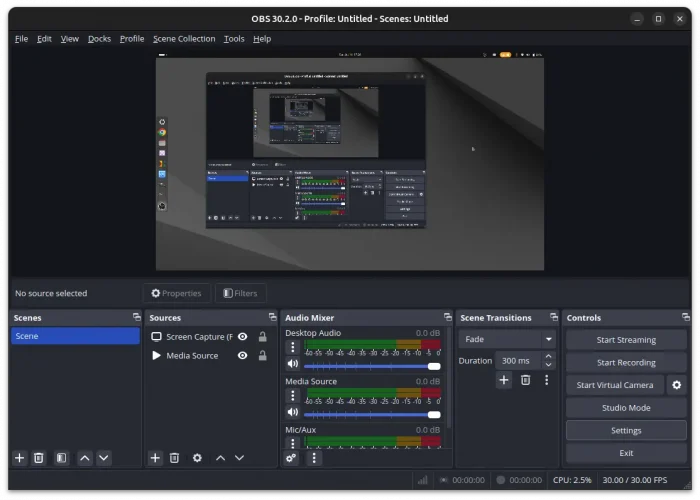OBS Studio, the popular free open-source live streaming software, announced new major 30.2.0 release a day ago.
The new release has some improvements for Linux support. They include native NVENC encoder interface for NVIDIA GPU hardware accelerated encoding, and NVENC AV1 support. And, Linux shared texture support to the NVENC encoder, QuickSync encoder, as well as VA-API encoder.
OBS Studio 30.2.0 also added multi-track video streaming support, aka Enhanced Broadcasting on Twitch.
To improve the experience for viewers with poor network conditions or those watching on older devices, the streaming service usually creates multiple video qualities of original high-quality source content.
Now, OBS Studio itself can produce multiple video qualities, though, it so far supports only Windows and requires NVIDIA GTX 900, GTX 10, or RTX 20 series GPU or newer or an AMD RX 6000 series GPU or newer. And, it will collect info, such as OBS version and audio/video settings, CPU, GPU, Memory, and OS info and set to the streaming service.
The release also introduced new Hybrid MP4 output format. Which, is recoverable even when writing the file is aborted, e.g. due to system crashes or power outages. So far, it supports H.264, HEVC, AV1 video codecs, and AAC, Opus, FLAC, ALAC, PCM audio codecs.
Other changes in the release include:
- Add Enhanced RTMP/FLV multi-track audio and video.
- Add HEVC support to WebRTC output.
- New Theme system (base theme + variants). Old themes will no longer work without update.
- Support closed-captions for HEVC and AV1.
- Support audio-only and video-only WHIP outputs.
- Enforce Qt Fusion style on Linux.
There are as well various other changes, and bug-fixes. See the official announcement for details.
How to Install OBS Studio 30.2.0
The Github project page includes the Source tarball, Windows EXE installer, macOS dmg, and Debian/Ubuntu deb packages, which are available to download via the link below (under Assets):
For Ubuntu 22.04 and Ubuntu 24.04, user can run the commands below one by one in terminal (Ctrl+Alt+T) to install from the official PPA.
sudo add-apt-repository ppa:obsproject/obs-studio
sudo apt update
sudo apt install obs-studio
For choice, there are also Snap package (unofficial and not updated at the moment of writing) and Flatpak package, though both of them run in sandbox environment.















